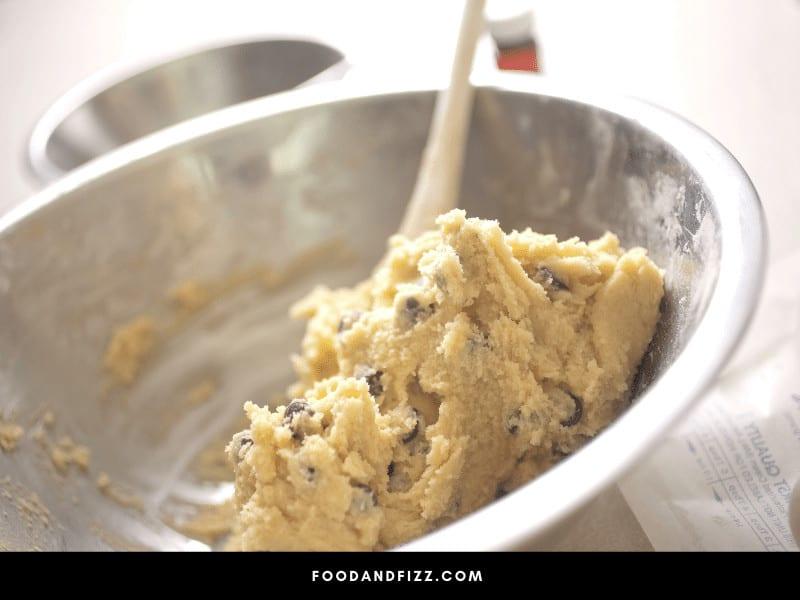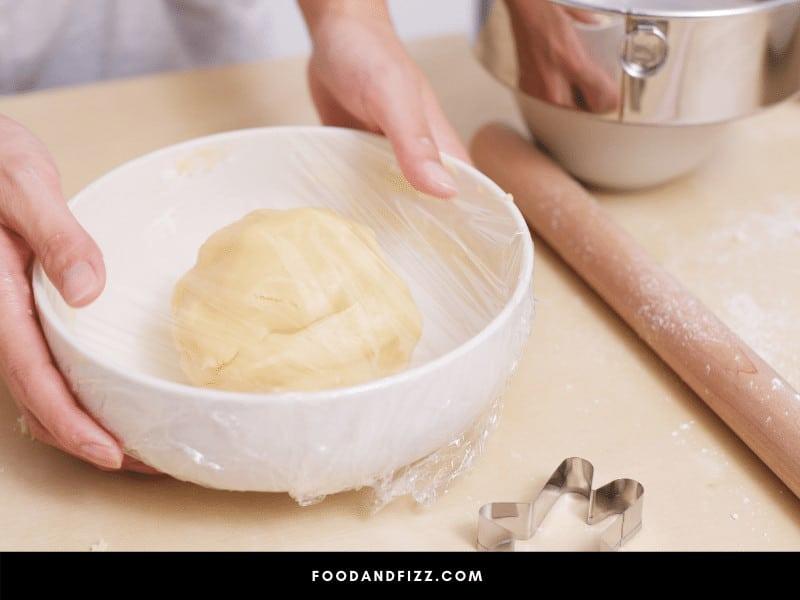Chilled Cookie Dough Too Hard – What To Do?
Cookies are fairly easy to make and something almost anyone can do. Most recipes do not take more than half an hour to make from start to finish, making it everybody’s favorite instant sweet snack.
There are days though when you want to have your cookies not in 30 minutes, but in 10 or less. What do you do? Easy!
Make a big batch and store your unbaked cookie dough in the fridge for 3 to 5 days (up to 3 months in the freezer), in preparation for those cookie craving emergencies.
Okay, so now you have some chilled cookie dough, and suddenly, the cookie craving attacks.
You preheat your oven to the right temperature, prepare your baking sheet and take the cookie out of the fridge or freezer, only to discover that it’s become one massive, rock-hard chunk of dough that you can’t work with. Your chilled cookie dough is too hard. What do you do?
My Chilled Cookie Dough Is Too Hard- What To Do?
If your chilled cookie dough is too hard, you can do one of four things. First, you can place it in a warm place (such as near a warm stove) so it can start to soften. Second, if it’s soft enough to cut with a knife, cut into smaller chunks so that they thaw faster. Third, you can defrost it in the microwave at short bursts of 5-10 seconds each, at the lowest setting possible, until just soft enough to work with. Fourth, you can place dough in a bowl and place it over another bowl with hot water. This allows the dough to soften without applying a direct heat source.

How Do I Thaw Chilled Cookie Dough That Is Too Hard?
Outlined below are some suggestions you can try to thaw out your too-hard cookie dough.
1. Place in a warm place
Place your cookie dough in a warm place, for example, next to a warm stove so that it can start to soften. Once soft enough to work with, you can then proceed to prepare them for baking.
2. Cut Into Smaller Chunks
If your dough is soft enough to be cut with a knife, cut them into smaller, workable chunks. This will allow them to thaw faster rather than waiting for one big chunk of dough to defrost.
3. Defrost in the Microwave
You need to be careful with this method as this has the potential to ruin your cookie dough. You can place the dough in a microwave-safe bowl and defrost in short bursts of 5-10 seconds each, in the lowest setting possible.
The short intervals make sure that we do not heat the dough too much and that we defrost it just until we can work with it.
If we heat it up too much, we may end up melting the fats in our dough that defeat the purpose of chilling to begin with, or worse, we may end up cooking our dough.
4. Place dough in a bowl and put over another bowl with hot water
This method softens the cookie dough without the direct application of a heat source. But as with the microwave method above, we must still be careful not to heat it up too much.

Why Do We Chill Cookie Dough?
Cookie dough is chilled for a variety of reasons, ranging from convenience to improving texture, to developing flavors.
1. To Develop Flavor
A lot of recipes call for chilling cookie dough in order to develop and deepen the flavors in the cookie. As the dry ingredients mix with the wet ingredients, time allows for chemical reactions to take place that allows the dough to hydrate and absorb all the different flavors that you put in, resulting in a cookie with a deeper, more complex flavor.
2. To Improve Texture
Fats like butter not only add a distinct flavor and aroma to cookies, but it also plays a crucial role in their final appearance and texture.
Chilling cookie dough allows the fat to harden so that when you finally bake your cookies, they won’t spread as easily, and they will be able to hold up their structure.
If you skip chilling and bake your cookies right away, especially if the butter is starting to melt, you may end up with flatter cookies. Flat cookies also tend to burn easily.
3. For Convenience
As we said earlier, sometimes you just want a cookie right now.
Having chilled cookie dough ready anytime significantly shortens the amount of time it takes between you wanting a cookie and actually eating a freshly baked cookie. Scooping them on a tray with parchment paper and baking cookies takes only a few minutes!

How to Chill Cookie Dough
Depending on your purpose and your timeline, cookie dough can be chilled both in the fridge and the freezer.
If you are just chilling the dough to develop the flavor and improve texture, and if you plan to bake the cookies within 3-5 days, you can safely store them in the refrigerator. Cookie dough will last up to five days in the fridge.
If, however, you want to store it for longer, or if you’ve made a huge batch that you can’t possibly finish in 3-5 days, your best bet is to store the dough in the freezer. In the freezer, cookie dough can last up to 3 months.
Tips for Properly Chilling or Freezing Cookie Dough
Ready to get into chilling mode? Read on for some handy tips.
1. Freeze dough in airtight containers or freezer bags
To protect your cookie dough and prevent it from absorbing flavors from all the other food in your fridge or freezer, make sure to put the dough in an airtight container or freezer bag.
You don’t want your chocolate chip cookies to suddenly taste like the curry you had for dinner last night. (If it’s something that interests you though, you can actually make curry-flavored cookies, just not in this way.)
2. Freeze In Smaller Workable portions
To avoid the problem of having to defrost a massive chunk of dough especially if you only want a few cookies, make sure to freeze or store your dough in small, workable portions.
You can already divide them into little balls prior to freezing or storing so that when cookie cravings hit, you just literally drop them on the baking sheet and bake away.
A handy tip: after making your dough, divide them into little balls and lay them out on a baking tray. Freeze for about 15-20 minutes. When the dough balls are hard enough, you can put them together in freezer bags without worrying that they will stick together.

3. Cover well with plastic wrap to avoid freezer burn
If you want to freeze your dough without portioning them, try to make it more of a flatter disk rather than a massive ball of dough.
Not only does it save freezer space, but it will also thaw faster and more evenly when you’re finally ready to bake them.
Make sure to wrap dough properly in plastic wrap to avoid the possibility of freezer burn.
4. Make sure that the dough for the specific cookie you are making can be frozen
Most cookie doughs can be stored in the fridge or frozen for a long time, and it won’t affect their texture and taste when baked – they’ll still taste as fresh as if you’ve just made them.
There are certain exceptions, though.
Cookies like Florentine cookies and Tuiles and other cookies with thinner batters or cookies that do not have a lot of fat, do not do well with freezing or chilling for a long time.
Most other cookie doughs, though, can safely be chilled.
5. Make sure raw cookie dough is properly wrapped to avoid cross-contamination
Especially if you have raw eggs in your cookie dough, make sure to wrap your cookie dough properly and keep it separate from food that will not be cooked prior to consumption, such as salads or fruits, or your chocolates and other snacks.
Raw eggs may contain harmful bacteria like Salmonella, and keeping your dough separate from other food in your fridge or freezer will decrease the chances of cross-contamination.

Can You Eat Raw Cookie Dough?
I admit I have done this once or twice, but I would not recommend it.
Raw eggs may contain harmful bacteria like Salmonella and consuming them puts you at risk for a food-borne illness.
If you absolutely must eat raw cookie dough, you can probably try to make cookies that do not use raw eggs.
Nowadays, there are a lot of alternatives you can use to mimic the binding action of eggs in recipes.
Ingredients like flax seeds, chia seeds, and psyllium husk are worth looking into, as they have a lot of health benefits as well.
One of my favorite cookie recipes is an egg-free and vegan-friendly recipe, and I tell you, it takes so much willpower to not eat the whole bowl before I bake them!
Conclusion to Chilled Cookie Dough Too Hard – What to Do?
It may seem like a big disaster if your cookie dough is too hard, especially if you’re experiencing a real cookie craving emergency.
However, as we’ve seen, there are quite a few things you can do to easily remedy the situation and even more things you can do to make things easier to handle the next time around.
Even if we must put in a little extra effort, trust me, the benefits of chilling are extremely worth it!
Frequently Asked Questions to Chilled Cookie Dough Too Hard – What to Do?
Is the fridge or the freezer a better option for chilling cookie dough?
Depending on your timeline, you can chill your cookie dough both in the fridge and the freezer. Cookie dough will last for about 3-5 days in the refrigerator and can last up to 3 months in the freezer when properly stored.
Should I wait for chilled cookie dough to thaw completely before baking?
In general, cookie dough can be baked directly from the freezer or the fridge, so you do not have to wait for it to completely be at room temperature. They may just need to cook for a few minutes more to make up for the colder temperature that they started in.
Can all kinds of cookie dough be frozen?
Most kinds of cookie dough can be frozen and baked eventually with no significant deterioration in quality and taste, but certain kinds of cookies like tuiles and Florentine cookies do not hold up to chilling or storing for a long time.

